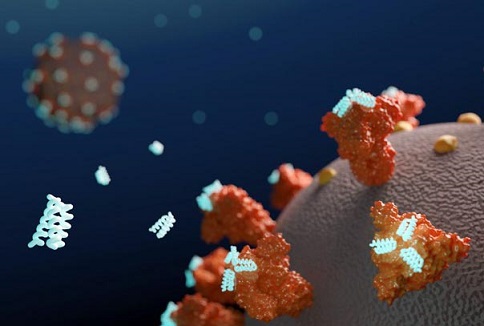Novel interaction between the SARS-CoV-2 envelope (E) protein and human cellular proteins BRD2 and BRD4 discovered
Nikhil Prasad Fact checked by:Thailand Medical News Team Jul 27, 2024 8 months, 4 weeks, 2 days, 2 hours, 9 minutes ago
COVID-19 News: Researchers unveil the mechanism behind SARS-CoV-2’s disruption of human immune response.
Scientists from the Andalusian Centre for Molecular Biology and Regenerative Medicine (CABIMER) in Seville, Spain, have uncovered a novel interaction between the SARS-CoV-2 envelope (E) protein and human cellular proteins BRD2 and BRD4. This groundbreaking study, detailed in
this COVID-19 News report, sheds light on how the virus manipulates host cell machinery to its advantage, offering potential new avenues for therapeutic intervention.
 Novel interaction between the SARS-CoV-2 envelope (E) protein and human cellular proteins
Novel interaction between the SARS-CoV-2 envelope (E) protein and human cellular proteins
BRD2 and BRD4 discovered.
Understanding BET Proteins and Their Role
The bromodomain and extraterminal domain (BET) family of proteins, consisting of BRD2, BRD3, BRD4, and BRDT, are essential epigenetic regulators that bind acetylated histone tails and control the formation of acetylation-dependent chromatin complexes. They influence the transcription of numerous genes. Among the Bet proteins, BRD2 and BRD4 play pivotal roles in regulating natural killer (NK) cell functions, including direct cytokine secretion, NK cell contact-dependent inflammatory cytokine secretion from monocytes, and NK cell cytolytic activities. They regulate the expression of many immunity-associated genes, underscoring their significance in immune response modulation. The study's focus on BRD2 and BRD4 is particularly relevant because these proteins are ubiquitous in human cells and play significant roles in the immune response.
The Viral Hijacking Mechanism
In the study findings, the researchers highlight how the SARS-CoV-2 E protein interacts with the SEED domains of BRD2 and BRD4, rather than the previously suggested bromodomains. This discovery was made by comparing the effects of overexpressing the E protein in human cells with those of inhibiting BET proteins using the drug JQ1.
The study found that while overexpression of the E protein in cells led to a significant upregulation of genes involved in the natural immune response and interferon signaling, inhibition of BET proteins resulted in the opposite effect. This indicates that the viral E protein and BET inhibitors affect cellular transcription through different mechanisms.
Detailed Findings from the Study
-Interaction Confirmation
The team conducted several experiments to confirm the interaction between the SARS-CoV-2 E protein and BRD2/BRD4. They used co-immunoprecipitation techniques in HEK293T cells, a common model for studying SARS-CoV-2, and found that the C-terminal region of BRD2 and BRD4, which includes the SEED domain, was responsible for binding to the E protein. Surprisingly, the bromodomains, which were initially thought to be the interaction sites, were not involved.
-Transcriptomic Analysis
By analyzing the transcriptomes of cells overexpressing the E
protein and those treated with the BET inhibitor JQ1, the researchers observed distinct differences. The E protein overexpression led to the activation of genes related to the immune response, particularly those involved in the interferon pathway. In contrast, JQ1 treatment downregulated these genes, underscoring the different outcomes of these two conditions.
-Potential for Targeted Degradation
Taking advantage of the specific interaction between the E protein and the SEED domain, the researchers explored the possibility of targeted degradation of the E protein using a PROTAC system. They designed a fusion protein that included the SEED domain and demonstrated that this construct could direct the degradation of the E protein in cells, highlighting a potential therapeutic strategy.
Implications for COVID-19 Treatment
The findings from this study open up new possibilities for treating COVID-19. By targeting the specific interaction between the SARS-CoV-2 E protein and the SEED domains of BET proteins, it may be possible to develop therapies that selectively degrade essential viral proteins, thereby hindering the virus's ability to manipulate host cell functions and evade the immune response.
Future Research Directions
The researchers at CABIMER plan to further investigate the therapeutic potential of SEED domain-based PROTACs. They also aim to explore the broader implications of their findings for other viruses that interact with BET proteins, which could lead to new antiviral strategies beyond COVID-19.
Conclusion
This study offers significant insights into the molecular interactions between the SARS-CoV-2 E protein and human BET proteins, revealing a novel mechanism of viral hijacking. The potential therapeutic applications of these findings could pave the way for more effective treatments for COVID-19 and possibly other viral infections.
The study findings were published in the peer-reviewed journal: Cellular and Molecular Life Sciences.
https://link.springer.com/article/10.1007/s00018-024-05343-8
For the latest
COVID-19 News, keep on logging to Thailand Medical News.
Read Also:
https://www.thailandmedical.news/news/new-insights-into-the-sars-cov-2-e-and-3a-proteins-and-their-roles-in-virus-assembly-and-immune-response
https://www.thailandmedical.news/news/new-revolutionary-imaging-technique-reveals-circular-rnas-encoded-by-viruses-including-sars-cov-2
